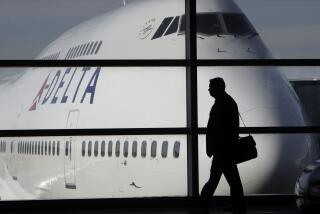Airlines Told to Inspect Flaps on MD-11 Jets : Aviation: FAA says defects found on some planes. Major U.S. carriers report no problems.
- Share via
The Federal Aviation Administration has told airlines operating McDonnell Douglas’ MD-11--regarded as the aerospace giant’s plane of the future--to immediately inspect their jetliners for cracking and wing-flap peeling that has already developed on several aircraft.
“This condition, if it is not corrected, could result in fatigue cracking and possible structural failure of the outboard flap,” the FAA said in an unpublicized airworthiness directive issued last month.
Nine major airlines already fly MD-11s, including American, Delta, Swissair and Finnair. But none of the airlines contacted Monday indicated that flight schedules were affected by the inspection order.
American and Delta officials said they found no wing-flap problems on the 294-seat jets, although a spokesman said American did replace the suspect flaps. Airlines have ordered more than 300 of the jets, which are believed to sell for more than $100 million each.
“All they’re saying is, ‘If you don’t fix this, it can cause something bad to happen in the future,’ ” said Don Skiados, a spokesman for the Washington-based Airline Pilots Assn. “This is not something out of the ordinary. If it was really bad, they would have grounded the fleet.”
Spokesmen for both Delta and American also said they were not worried. “When you put a new airplane in the air, you expect these types of teething problems,” said Delta spokesman William Berry. Delta has plans to purchase up to 46 of the planes and has tapped the MD-11 as the flagship of its international fleet.
Berry noted that earlier this year some problems with the MD-11 computer software were also discovered--and corrected.
A McDonnell spokesman said the most recent MD-11 problem was discovered on a test aircraft; later, additional cracking was discovered on some aircraft operated by airlines. The spokesman said the company regards the problem as a minor issue with no bearing on safety.
“We thought it would be prudent to make some design changes and improvements on aircraft still on the line and have operators make the improvements,” he said.
Under FAA regulations, an airworthiness directive is issued when “an unsafe condition exists in a product and . . . that condition is likely to exist or develop in other products of the same type design.” The directive last month was the second issued by the FAA on the MD-11. The agency also warned in November that an “uncontained fuel leak” was detected in an aft fuselage compartment on an MD-11 operated by an airline, resulting from an improper seal.
The FAA did not identify the airline that experienced the leak or provide any flight details. “This condition, if not corrected, could result in a fuel leak in the aft fuselage compartment area and the possibility of an in-flight or ground fire,” the directive said.
More to Read
Inside the business of entertainment
The Wide Shot brings you news, analysis and insights on everything from streaming wars to production — and what it all means for the future.
You may occasionally receive promotional content from the Los Angeles Times.











